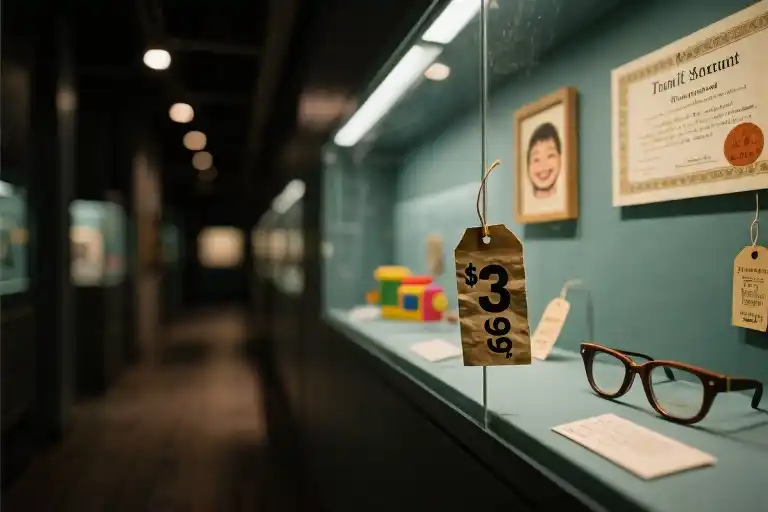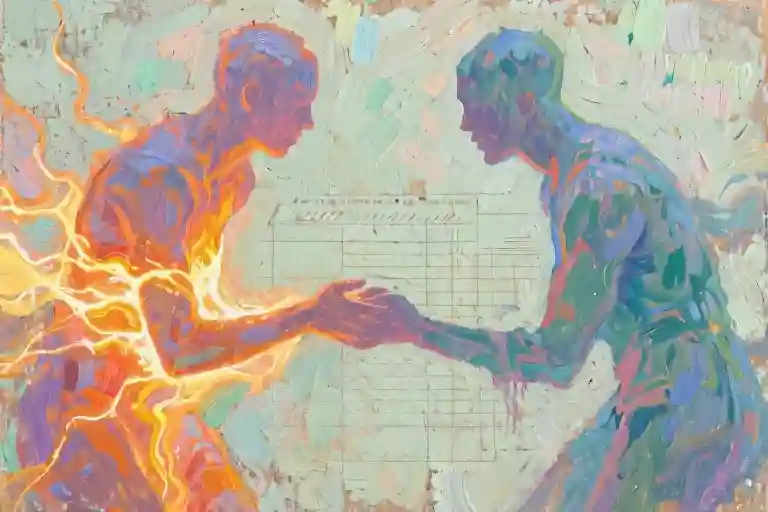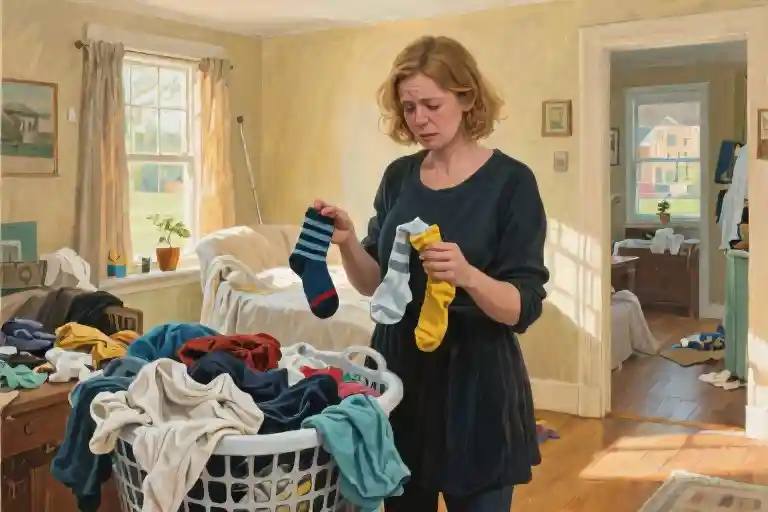The breakfast table held three perfect omelets – my father’s with extra cheese, my mother’s with diced peppers, mine with precisely seven spinach leaves arranged like the stars of Ursa Minor. Outside, fresh snow blanketed our suburban lawn in undisturbed white, while inside, the scent of Colombian coffee mixed with my mother’s jasmine perfume. A small wrapped gift sat untouched next to my orange juice, its silver ribbon catching December sunlight.
My parents’ laughter bounced between the stainless steel appliances, their fingers brushing over the fruit bowl in a twenty-year-old mating dance. From my vantage point – chewing methodically on vitamin-enriched toast – I could see the framed family photos lining the hallway: Disneyland grins, graduation caps tossed in slow motion, Christmas sweaters matching down to the embroidered reindeer noses. The complete set, no missing pieces.
‘Be grateful,’ my mother said without looking up from slicing strawberries. The words landed between us like a fourth place setting.
Down the street, Jamie’s parents were finalizing their divorce. Two blocks over, Sophia’s family was rationing insulin for her diabetic brother. Back in Bogotá, my cousin Luisa shared a single laptop with three siblings for virtual classes. And here I sat, the princess of the cul-de-sac, with custom orthodontics and a college savings account that could feed a village for a year.
The snow continued falling outside, each flake identical until you examined them closely. My reflection in the bay window showed a girl with good skin, good grades, and good prospects – the trifecta of immigrant parent dreams. The glass also revealed something else: my fingers picking unconsciously at the $3.99 tag still stapled to the sleeve of my Gabe’s sweater, the red clearance sticker leaving a faint mark on my wrist like a brand.
The Museum of Privilege
Exhibit 1: Parental Love (Preservation Status: 20 Years)
The diorama shows two immigrants slow-dancing between the refrigerator and microwave, their laughter bouncing off linoleum floors. My father’s hands still smell like hospital antiseptic from his night shift, my mother’s hair wrapped in a towel turban after her double waitressing shift. They’re performing what sociologists would later call “the immigrant tango” – that particular way working-class couples lean into each other’s exhaustion. Visitors often mistake this for romance. The small plaque explains it’s actually shared survival tactics, the kind that leaves children feeling both sheltered and strangely lonely.
Exhibit 2: Educational ROI Charts
Backlit displays compare my SAT prep books stacked like architectural wonders against photographs of cousins in Guangzhou sharing single textbooks. The interactive screen lets you toggle between variables: private tutors ($85/hr) vs. public library resources (free), college application consultants vs. handwritten personal statements. A footnote in size-8 font reads: “Data may not account for emotional costs including but not limited to: chronic jaw clenching, recurring nightmares about failing, and the inability to accept compliments without suspicion.“
Exhibit 3: Framed Perfect Transcript
Encased in museum-grade glass with precisely calculated lighting to minimize glare on the 4.0 GPA, this centerpiece installation includes:
- The $89.99 custom frame (acid-free matting)
- Microscopic indentations where erasers dug too deep
- Invisible ink annotations: “Why B+ in PE?” and “Not valedictorian yet”
The audio guide mentions how these documents become psychological IOU notes – each A a promissory stamp guaranteeing future happiness that never quite materializes. Some visitors report smelling faint anxiety sweat when standing too close.
Between exhibits, the ambient soundtrack loops parental whispers: “Do you know how lucky you are?” in twelve languages. The gift shop sells “Privilege Guilt Bingo” cards and erasers shaped like burning diplomas. A popular interactive station invites guests to calculate their own emotional exchange rates using the formula:
(Visible Advantages) ÷ (Invisible Struggles) = The Number You’ll Be Told Is Irrational
The fire exits are all marked “Gratitude” but push bars don’t work.
The Receipts No One Asked For
My glasses came with two prescriptions. The optometrist’s neat handwriting specified -2.75 diopters for myopia, -1.50 for astigmatism. The social optometry was less precise: thick lenses that magnified my eyes like specimen jars, frames that slipped when I laughed at jokes I didn’t understand, and an eternal indent on the bridge of my nose that reappeared within minutes of taking them off.
At sixteen, I developed a habit of cleaning them obsessively – not because the world looked blurry, but because I hoped wiping away fingerprints might also remove the stares. The cafeteria lights reflected off my lenses in a way that made people ask if I was crying. Sometimes I was.
Exhibit B arrived every August in a garbage bag from Gabe’s, the discount store where $3.99 bought you a polyester time capsule of someone else’s childhood. That red-and-black checkered shirt smelled permanently of fabric softener and other people’s basements. The tag itched my neck all through AP Chemistry, right where the popular girls wore their Hollister logo patches.
I developed elaborate rituals around these shirts: soaking them overnight to remove the thrift store smell, using scissors to carefully excise the price tags without leaving telltale threads, folding them so the pilling fabric wouldn’t show. My mother called this resourcefulness. My classmates called it something else.
The email incident happened on a Tuesday. Exhibit C exists as seventeen read receipts burning brighter than any notification I’d ever received. Seventeen people had seen the words I’d stayed up past midnight composing, seventeen screens glowing with my awkward confession before it became group chat material. By third period, even the janitor knew about the immigrant girl who thought she deserved a boyfriend.
What the receipts don’t show: the way my fingers trembled hitting send, the three hours I spent drafting four paragraphs, the dictionary open to check every word. The cruel math of immigrant parenting – all those English lessons never covered how to say ‘I like you’ without sounding like a textbook.
My glasses fogged up that day in a way no lens cloth could fix. The shirt collar felt like sandpaper. And somewhere between Biology and Calculus, I learned that privilege comes in denominations too small to cover emotional damages.
Emotional Accounting
The ledger of my adolescence never balanced. On paper, I held assets any immigrant family would celebrate: bilingual fluency that came with accent marks on both languages, a college-ready GPA stacked like unopened scholarship letters, parents whose combined income placed us comfortably in the suburban middle class. These were the numbers we reported at family gatherings, the metrics that made my mother’s friends sigh when comparing children.
Assets (Itemized)
- Linguistic Capital: The ability to switch between restaurant orders and parent-teacher conferences without missing a beat, though my tongue always hesitated on vowels caught between two worlds.
- Academic Collateral: That pristine 4.0 printed on thick cardstock, its edges already fraying from being pulled in and out of my backpack like a get-out-of-jail-free card.
- Family Equity: A home without foreclosure notices, health insurance that covered braces but not therapy sessions.
Yet no one discussed the liabilities column growing quietly in the red:
Liabilities (Accruing Interest)
- Identity Deficit: The hollow space where cultural belonging should be, too American for the homeland relatives yet perpetually ‘fresh off the boat’ to classmates. My name became a phonetic battleground—teachers tripping over syllables while peers weaponized its sounds.
- Emotional Bad Debt: Compound interest on stifled complaints. Each ‘Be grateful’ deposited into my mental account while withdrawals for validation bounced. The overdraft fee? That afternoon in the computer lab when my confession of affection became group entertainment, laughter echoing louder than any deposit of parental praise.
- Self-Worth Amortization: The slow depreciation of my reflection in department store mirrors, fingers picking at Goodwill tags while calculating how many AP books equaled one pair of brand-name jeans.
The auditor’s note scrawled across my teenage years read: Sustainability concerns identified. My assets were illiquid—fluency didn’t prevent lunchroom isolation, academic honors couldn’t be traded for genuine connections. The balance sheet looked robust until you noticed the footnotes:
*Contingent liabilities include but are not limited to:
- Recurrent dreams of erasure (both accidental and intentional)
- Persistent sense of being an accounting error in someone else’s life
- Emotional reserves maintained at minimum viable levels*
Bankers would call this a liquidity crisis. Psychologists might label it high-functioning depression. I just knew the numbers never added up to how empty I felt staring at honor roll certificates that couldn’t compensate for the ache of being ‘too much’ in someone’s inbox and never enough in my own skin.
The Unfinished Symphony of Belonging
The email draft still lives in my desk drawer, folded into fourths like a failed origami project. Its creases have memorized the shape of my humiliation. Sometimes when I rummage for paper clips, the corner peeks out—a stubborn ghost refusing to be archived. The words haven’t changed, though I’ve rewritten them a thousand times in my head. What still surprises me isn’t the cruelty of teenagers (that’s practically a law of nature), but how the memory crystallizes around physical objects rather than emotions. The way the keyboard felt sticky under my fingers that afternoon. The chemical lemon scent of the school computer lab. The exact shade of robin’s egg blue on the monitor frame where I kept glancing to avoid seeing my own reflection.
Mom still buys my shirts at Goodwill. She presses them with more care than our wedding photos, smoothing out the bargain bin wrinkles with an iron set precisely to ‘cotton/linen.’ Last week I caught her sniffing a polo shirt before washing it, checking for that thrift store musk we both pretend not to notice. Her silence as she folds the clothes is different from the grateful silences she taught me—this one hums with something like regret, or maybe just static from the old laundry room radio tuned between stations.
My 4.0 GPA certificate developed a crease last semester when I shoved it under a pile of college brochures. The corner got bent where the word ‘excellence’ hits the fold, the ink slightly smeared from that time rain leaked through my backpack. It’s funny how we’re taught to preserve these trophies, as if future happiness depends on their archival quality. Nobody mentions what to do when the paper starts yellowing at the edges, or when the achievement it represents feels less like a milestone and more like a receipt for emotional debts paid in advance.
Three artifacts. Three unfinished stories. The email never sent, the shirt never new, the achievement never enough. They sit in my life like museum pieces with half-written placards—the curator got distracted mid-label and never returned to complete the thought. Maybe that’s the real inheritance of growing up between cultures: becoming fluent in the grammar of absence, learning to parse the meaning in what goes unsaid as much as what gets articulated.
From my bedroom window, I can see the neighbor’s kid playing basketball alone, counting out loud in a language his grandparents wouldn’t recognize. His sneakers leave temporary marks on the driveway—faint scuffs that’ll fade after the next rain. We nod sometimes when we take out the trash, that particular head tilt second-gen kids reserve for each other. It says: I see your unbelonging. It matches mine.
The shredder in the school office makes a sound like popcorn kernels exploding when it processes old documents. I’ve been imagining feeding it certain words lately. ‘Grateful.’ ‘Privileged.’ ‘Obligation.’ Watching the blades reduce them to linguistic confetti. There’s a strange comfort in picturing the machine choking on ‘be’—that incomplete commandment—leaving the rest of the sentence to dissolve unspoken on my tongue.





